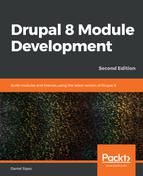Now that we have a general idea as to what a service is, let's create one to see all this in practice.
As I mentioned earlier, I want my greetings to be more dynamic, that is, I want the salutation to depend on the time of day. So, we will create a (HelloWorldSalutation) class that is responsible for doing that and place it in the /src folder (our module's namespace root in a file naturally called HelloWorldSalutation.php):
namespace Drupalhello_world;
use DrupalCoreStringTranslationStringTranslationTrait;
/**
* Prepares the salutation to the world.
*/
class HelloWorldSalutation {
use StringTranslationTrait;
/**
* Returns the salutation
*/
public function getSalutation() {
$time = new DateTime();
if ((int) $time->format('G') >= 00 && (int) $time->format('G') < 12) {
return $this->t('Good morning world');
}
if ((int) $time->format('G') >= 12 && (int) $time->format('G') < 18) {
return $this->t('Good afternoon world');
}
if ((int) $time->format('G') >= 18) {
return $this->t('Good evening world');
}
}
}
By now, I assume that the namespace business is clear, so I won't explain it again. Let's see what else we did here. First, we used the StringTranslationTrait in order to expose the translation function (I will explain this later on). Second, we created a rudimentary method that returns a different greeting depending on the time of day. This could probably have been done better, but for the purposes of this example, it works just fine.
Now that we have our class, it's time to define it as a service. We don't want to be going new HelloWorldSalutation() all over our code base, but instead, register it with the Service Container and use it from there as a dependency. How do we do that?
First, we will need, yet again, a YAML file: hello_world.services.yml. This file starts with the services key, under which will be all the service definitions of our module. So, our file will look like this (for now):
services:
hello_world.salutation:
class: Drupalhello_worldHelloWorldSalutation
This is the simplest possible service definition you can have. You give it a name (hello_world.salutation) and map it to a class to be instantiated. It is a standard practice to have the service name start with your module name.
Once we clear the cache, the service will get registered with the Service Container and will be available to use.
